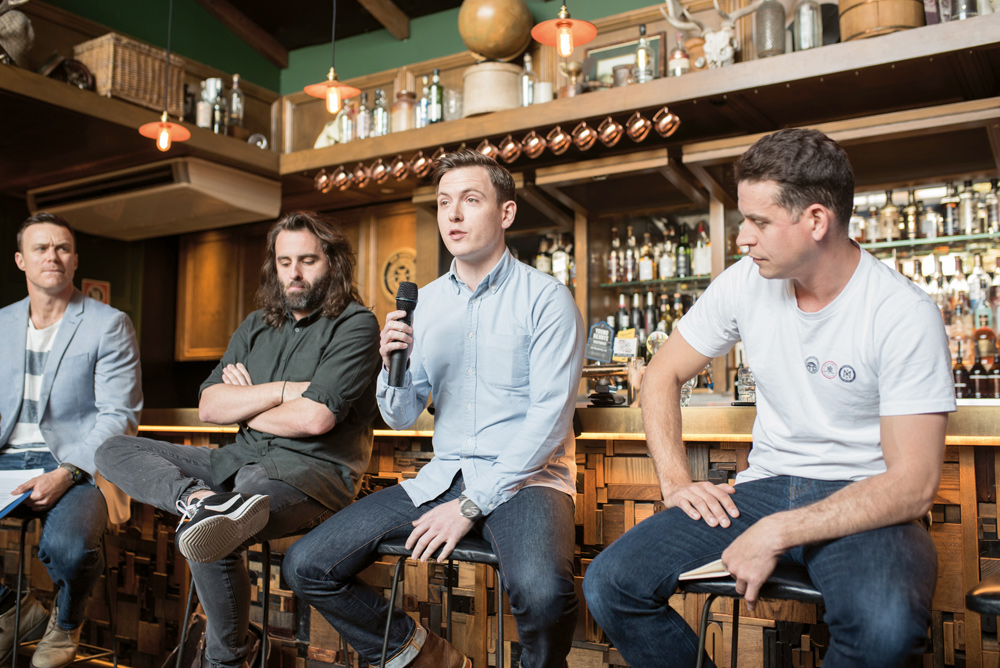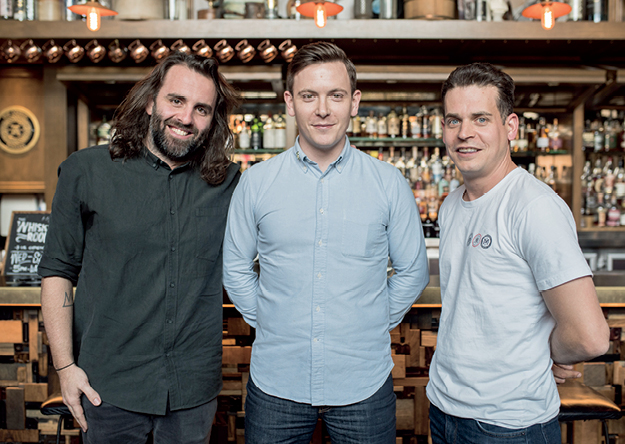
Zero-waste bartending. Closed loop. Is all this sustainable bar stuff nothing but empty marketing terms, or is there something more to it? During Sydney Bar Week this year at The Business of Bars Conference that was the topic, when a panel comprised of Sam Egerton (Merivale), Toby Kline (Adelaide Hills Distillery) and Luke Whearty (Operation Dagger) were quizzed by Australian Bartender publisher David Spanton. Below and lightly edited for clarity, here’s what they had to say.
What is sustainability? What is it that we are talking about when we talk about sustainability?
Luke Whearty: I wouldn’t label us as a sustainable bar — zero-waste? No, far from it. But that doesn’t mean we shouldn’t stop trying. If you look at everything on a day to day level, and even in your personal life and not just in bars, and if you want to aim at being sustainable, it can be really overwhelming.
If everyone does their part and focuses on these small little areas [where] they can make a difference, it can make a big difference. At Operation Dagger we try wherever we can to reduce our waste and make a more sustainable bar and hopefully at the end of the day it contributes to a better product and gets people thinking about what they’re drinking rather than being ignorant to it.
Sam Egerton: My exploration into the sustainability movement came with Charlie Parker’s, which we opened last year. That was a venue that we didn’t intend to be sustainable, but we kind of had the moniker attached to us as we started opening. I think it came from the background of where we wanted to run an efficient, profitable venue, and we realised one of the smartest ways was to utilise everything rather than having waste, and it just so happened that at the same time sustainability was kind of picking up and we got swept along, and now it’s something that we make a pretty cool part of what we do. For us, for myself and for Toby who is the venue manager over there, sustainability for us is more than just the products that you use in the bar and using all the elements of the fruit, it’s around the sustainability of ourselves — making sure that someone like myself who’s been in the industry for 16 years that I can do it for another 16 years sustainably, and how we can have an affect on our industry as well.
Is it just a buzzword?
SE: I personally believe that it’s becoming the standard now — I hope it becomes the standard. I think it started off as a fad but now, more and more it’s commonplace that people are asking the questions around what they’re wasting, where their product’s coming from, where it’s going, so I hope it becomes a benchmark for the industry.
Toby Kline: I think it’s quite an interesting one because all of us on the panel started out saying that we didn’t label ourselves as sustainable. So it’s something that is a root belief and the word I use is ‘consideration’: considering what your impact is, where things come from, and what the process is. As far as it as a trend or what the longevity of it is, you have to look at its sister industry being food, and you look at the food movement and the understanding of where something comes from. It’s definitely coming to the bar industry and it’s been growing at a rapid rate — how many restaurants do you go to that don’t have full knowledge of where their produce comes from? It’s something that is here for a while I believe.
What is zero-waste bartending?
SE: I think it’s a buzzword. Luke touched on something, you guys are probably all aware of Pour, there was a talk by a chef and he was classed as being zero-waste as well. It’s a journey, it’s not necessarily a place you can go to, as Luke touched on, zero waste is maybe a non-existent destination because really, can you truly be zero-waste? But I think it’s a destination we should all try heading towards.
What about closed loop bartending?
LW: It’s the same thing, but different words. That how I started using it in bars, was just trying to find a use for an ingredient more than once. A perfect example is, I love vanilla — it’s like crack — but we were using so much of it, and it’s so expensive, we were trying to find out ways to get a better life out of it and we were saying ok, maybe you can get more than one infusion out of it. And that turned into, OK, let’s hollow them out and use them as straws, and then that turned into OK, we don’t need plastic straws. Quite often this one idea starts branching off and starts another.
Which bars are leading the way?
LW: Yeah, Ryan Chetiyawardana is at the forefront of this, and has been for years. White Lyan, Dandelyan, Super Ryan — he has definitely latched onto that and made it a big part of his ethos, so I see him as being a leader in that. He’s made that the focus of his venues, which is great, but you don’t necessarily have to do that to take part in this and make a contribution. Even if it’s just eliminating plastics from your bar, that’s a good thing.

In terms of tangible steps, what can you do?
LW: One of our most popular drinks is basically a riff on the Pina Colada, with a sous-vide infusion with freshet pineapple. Once the infusion was made, we were then just throwing that away and it seemed like an awful waste. And I’d only just learned in the last three years or so about tepache, which is a fermented pineapple beer of sorts from Mexico. So we took that and made a tepache out of it, so gave it a second life. That was a drink that, in terms of being financially profitable for you, it was something we were throwing in the bin. We use a recycled tonic water bottle to put it in to sell to the guests or give out as an amuse bouche.
SE: The one we talk about quite a bit is the lemon — a simple thing, we use citrus all the time. We describe the juice of a lemon as the prime cut, if you think of the butcher, they take the prime cut and they use every other piece. But in bars we take the prime cuts and we throw everything else out. One of the things we did and do at Charlie Parker’s is we have soda taps, just corner kegs in which we make our in-house sodas. We take the husks leftover from juicing, and make an oleo, and that gives us a lime or citrus syrup, which we put into these corner kegs and then we have a lemonade. So we have paid for it once for our juice, but being able to use it again to have lemonade which means you’re not having to buy lemonade in and reducing the cost of that, not having to chuck out bottles from lemonade or plastic from postmix.
On top of that, with our top to tail philosophy, we would buy everything from providers and ask for every piece that they could give us, so not just the carrot but we want the stalk, we want the leaves, and we would try to use every element of that. If we don’t use it straight away, things go down to make bitters or tepaches or ferments, so our back of house is crawling with bits and pieces bubbling away which is pretty cool.
TK: The one that was very much a food term but is creeping into bars is that of food miles, making sure wherever we can source local, seasonal produce and fortunately enough Australia is one of the number one producers of a lot of that produce so actually knowing where something comes from and how it gets to your door a lot of the time has more sustainable impact than anything we can do ourselves, so it’s really just having that consideration for the steps that go into the process.
SE: A couple of years ago when I was at Palmer & Co we put on a lime prohibition for two months, because limes were really expensive. We were really worried that the guest was going to turn around and ask where is my lime in my Vodka Lime & Soda. And the amount of people who actually complained about it was negligible. We offered alternate citrus and all sorts of things. The point I’m trying to make is we assume that guests would refuse to not have the lime in their Vodka Lime & Soda, but once you explained it to them, they were fine. The same thing happened with Charlie Parker’s when we stopped offering straws. We are trying to find a sustainable replacement for straws, we haven’t found one we’re completely happy with just yet, but we stopped offering straws. And that cut our usage from 50 to one. And the point is that I think we assume that our guests are not intelligent enough to be a part of the same thing that we’re doing. A lot of them are on the same page.
For me, biodegradable straws, the ones that are out at the moment, they break down to a certain extent but they don’t completely break down. So in my opinion there’s no point in paying more for something that is effectively the exactly the same product. I use the coconut oil analogy: everyone thinks that coconut oil is healthier than other fats but it’s not, everyone believed it was because that was the spin. I think that a lot of the biodegradable PLA straws that are out now are exactly the same thing.
LW: With the straw thing, we’re really lucky at Operation Dagger, it’s actually a rare occasion that we get an order for a Vodka Lime & Soda, and we’re quite a small bar, so it’s a lot easier for us. I do understand for larger venues and especially pubs, that’s going to be more of a challenge. There’s other alternatives, there’s glass straws, there’s bamboo, I saw on Instagram the other day that someone was using pasta. If you communicate that to your guest, and if they’re on that mission with you, it’s going to make it a hard fight to fight.
If it is going to be an uphill battle, maybe it’s better to start small. The biggest that got me to decide I didn’t want to use straws anymore, was because we were using them to taste drinks. This was back in Melbourne years ago, where we’re tasting 300 cocktails a night — there’s 300 straws that just go into the bin. So why not just eliminate that first, and start small?
On the economics of sustainability
TK: I look at time as an investment, so if you’re taking that time to change the culture or think about how things can be done better, almost every stage of that sustainable story we’ve told is about possible profitability. Like going back to 2002 when sustainability started kicking off in hospitality in the accomodation sector, whoever that guy was who spent the time to think about the sign that makes you either put your towel on the ground or hang it up to reuse, something so simple, has had some of the biggest sustainable impacts in our industry. But that dude saved that company an absolute fortune. Sustainability not only drives doing the right thing, but it also has the possibility of a future economic benefit.
SE: What became sustainability for us was really saying that if we wanted to have X amount for our wages, we knew we had to drive a really low beverage cost, so how can we make our drinks as cheap as possible on the bottom line, and that’s how it came out for us. All the things we do that are sustainably minded, need to be economically driven as well, because you could make your bar zero-waste but it probably wouldn’t make any money and it probably won’t be around in three months.

